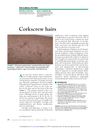 July 2024 in “Medical alphabet”
July 2024 in “Medical alphabet” Premature graying and hair changes can be treated with certain peptides and possibly targeting the endocannabinoid system.

Enterococcus faecalis delays wound healing by disrupting cell functions and creating an anti-inflammatory environment.
 February 2024 in “Medicina-lithuania”
February 2024 in “Medicina-lithuania” Obesity and bariatric surgery can cause hair thinning and temporary hair loss due to nutritional deficiencies and stress.
January 2024 in “Diagnostics” Long COVID causes a wide range of long-lasting symptoms that change over time and are hard to diagnose and treat.
December 2023 in “Acta dermato-venereologica” Metformin might help treat certain skin conditions, but more research is needed.
 August 2023 in “Journal of analytical & pharmaceutical research”
August 2023 in “Journal of analytical & pharmaceutical research” Microneedle-assisted therapy with human basic fibroblast growth factor significantly regrew hair in patients with hair loss.
 July 2023 in “The Journal of Clinical Endocrinology and Metabolism”
July 2023 in “The Journal of Clinical Endocrinology and Metabolism” Gender-affirming hormone therapy improves physical performance in trans men to the level of cisgender men, while in trans women, it increases fat mass and decreases muscle mass, with no advantage in physical performance after 2 years.

Older people tend to have higher biotin levels, which are weakly linked to certain blood components and negatively linked to triglycerides; biotin should be checked in patients with high triglycerides or medication-related skin issues, and only supplemented if deficient. Vitamin D and folate deficiencies are linked to specific skin conditions.
 June 2023 in “Antioxidants”
June 2023 in “Antioxidants” Lipids from Schizochytrium sp. help prevent hair loss by protecting hair cells from damage and promoting hair growth.
 May 2023 in “Journal of Clinical Medicine”
May 2023 in “Journal of Clinical Medicine” New understanding and treatments for hair loss are improving, but more research is needed.
 December 2021 in “Acta Marisiensis”
December 2021 in “Acta Marisiensis” Insulin resistance increases the risk of developing type 2 diabetes and other health issues.

Hair loss after weight loss surgery can improve over time.
November 2020 in “IntechOpen eBooks” Not getting enough minerals can lead to health problems and shorter lifespans.
January 2020 in “Korean journal of ophthalmology/Korean Journal of Ophthalmology” Minoxidil increases cell layer permeability by reducing tight junction proteins and raising ROS levels.
 April 2011 in “한국생물공학회 학술대회”
April 2011 in “한국생물공학회 학술대회” Lotion with fucoidan from brown seaweed improved skin and reduced allergy symptoms in mice with dermatitis.
March 2023 in “Anais Brasileiros De Dermatologia” Topical minoxidil is the best-supported treatment for female hair loss, but personalized plans are needed.
September 2022 in “Dermatology and therapy” Androgenetic alopecia is linked to heart disease, metabolic issues, and mental health problems.
 226 citations,
September 2001 in “Journal of The American Academy of Dermatology”
226 citations,
September 2001 in “Journal of The American Academy of Dermatology” Hair loss in women is genetic, diagnosed by examination and biopsy, and treated with minoxidil, finasteride, or transplantation.
 1 citations,
March 2018 in “Dermatologie pro praxi”
1 citations,
March 2018 in “Dermatologie pro praxi” Most over-the-counter hair loss treatments lack strong evidence of effectiveness, except for minoxidil, which works but stops working if you stop using it.
 3 citations,
April 2015 in “Cleveland Clinic Journal of Medicine”
3 citations,
April 2015 in “Cleveland Clinic Journal of Medicine” The woman has scurvy and needs more vitamin C.
 150 citations,
April 2008 in “Journal of The American Academy of Dermatology”
150 citations,
April 2008 in “Journal of The American Academy of Dermatology” Scalp dermoscopy is good for diagnosing a type of hair loss and helps choose the best spots for biopsy.
 56 citations,
January 2021 in “Clinical and Experimental Medicine”
56 citations,
January 2021 in “Clinical and Experimental Medicine” The document concludes that while there are various treatments for Alopecia Areata, there is no cure, and individualized treatment plans are essential due to varying effectiveness.
 48 citations,
September 2013 in “Oncologist”
48 citations,
September 2013 in “Oncologist” Endocrine therapies for cancer significantly increase the risk of hair loss.
 20 citations,
July 2008 in “Dermatologic Therapy”
20 citations,
July 2008 in “Dermatologic Therapy” The document says that treating the root cause of hair follicle damage is crucial to prevent permanent hair loss, and treatment options vary.
 19 citations,
January 2012 in “International Journal of Trichology”
19 citations,
January 2012 in “International Journal of Trichology” Propionibacterium acnes might be linked to hair casts and possibly alopecia.
 13 citations,
February 2016 in “Clinical Medicine”
13 citations,
February 2016 in “Clinical Medicine” The document concludes that diagnosing and treating hair loss is complex and requires understanding its psychological effects and underlying causes, while also calling for more research and new treatments.
 12 citations,
November 2014 in “PLOS Computational Biology”
12 citations,
November 2014 in “PLOS Computational Biology” The study concluded that hair growth in mice is regulated by a stable interaction between skin cell types, and disrupting this can cause hair loss.
 11 citations,
January 2015 in “Current problems in dermatology”
11 citations,
January 2015 in “Current problems in dermatology” The conclusion is that treatments like finasteride and minoxidil can prevent baldness progression and improve hair density, but more research is needed on other therapies.
 3 citations,
January 2019 in “Skin Research and Technology”
3 citations,
January 2019 in “Skin Research and Technology” Frequent use of hair straighteners can cause hair loss similar to scarring alopecia in young Turkish women.
 1 citations,
January 2001 in “American Journal of Kidney Diseases”
1 citations,
January 2001 in “American Journal of Kidney Diseases” Hair loss in three Southeast Asian women with kidney failure may be linked to their anemia treatment with erythropoietin.
























